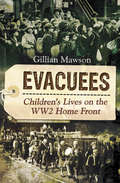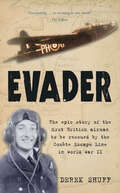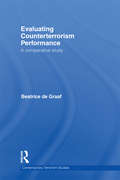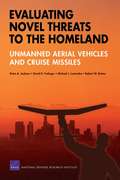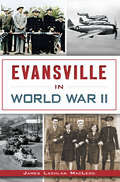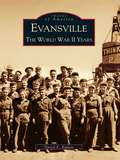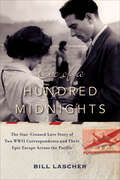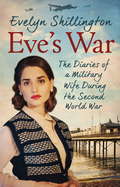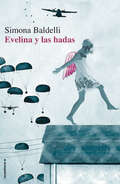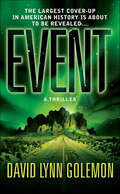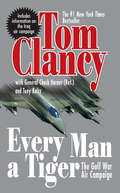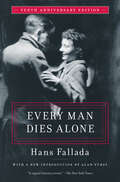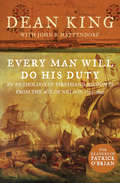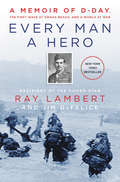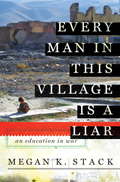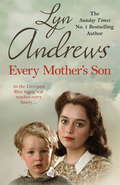- Table View
- List View
Evacuees: Children's Lives on the WW2 Home Front
by Gillian MawsonOn the outbreak of the Second World War, during the first week of September 1939 over three million people were evacuated. Operation Pied Piper was the largest ever transportation of people across Britain, and most of those moved to safety in the countryside were schoolchildren. Social historian Gillian Mawson has spent years collecting the stories of former evacuees and this book includes the personal memories of over 100, in their own words. Their accounts reveal what it was like to settle into a new home with strangers, often staying for years. While many enjoyed life in the countryside, some escaping inner-city poverty, others endured ill-treatment and homesickness.A fascinating insight into the realities of wartime life, and a valuable oral history of a unique moment in British history.
Evader: The Epic Story of the First British Airman to be Rescued by the Comete Escape Line in World War II
by Derek ShuffIn 1941 air gunner Sergeant Jack Newton’s Wellington is hit by flak on his first bombing raid over Germany. Miraculously, the skipper makes an emergency landing on a German-occupied Belgian airfield, narrowly avoiding Antwerp Cathedral. Having torched the plane, the crew give the unsuspecting Germans the slip and are hidden by the Resistance. Hoping to make it to the coast and back across the Channel, the airmen are surprised when the 23-year-old female leader of the Comete Escape Line, Andree de Jongh – codenamed Dedee – has other plans for them. Full of terrifying and humorous moments, this is the story of the epic journey of the first British airman to escape occupied Europe during the Second World War.
Evaluating Counterterrorism Performance: A Comparative Study (Contemporary Terrorism Studies)
by Beatrice de GraafThis book offers a new model for measuring the success and impact of counterterrorism strategies, using four comparative historical case studies. The effectiveness of counterterrorism measures is hard to assess, especially since the social impact of terrorist attacks is a fundamental and complex issue. This book focuses on the impact of counterterrorist measures by introducing the concept of the performative power of counterterrorism: the extent to which governments mobilize public and political support - thereby sometimes even unwittingly assisting terrorists in creating social drama. The concept is applied to counterterrorism in the Netherlands, Italy, the Federal Republic of Germany and the United States in the 1970s. Based on in-depth case study research using new primary sources and interviews with counterterrorist officials and radicals, a correlation is established between a low level of performative power and a decline of terrorist incidents. This is explored in terms of the link between social drama (as enhanced by counterterrorist measures) and ongoing radicalization processes. This book demonstrates that an increase in visible and intrusive counterterrorist measures does not automatically lead to a more effective form of counterterrorism. In the open democracies of the west, not transforming counterterrorism into a performance of power and repression is at least as important as counterterrorism measures themselves. This book will be of much interest to students of terrorism and counter-terrorism, discourse analysis, media and communication studies, conflict studies and IR/Security Studies in general.
Evaluating Novel Threats to the Homeland
by David R. Frelinger Michael J. Lostumbo Robert W. Button Brian A. JacksonChanges in technology and adversary behavior will invariably produce new threats that must be assessed by defense and homeland security planners. An example of such a novel threat is the use of cruise missiles or unmanned aerial vehicles (UAVs) by terrorist groups. Individual threats cannot be assessed in isolation, however, since adversaries always have many options for staging attacks. To examine this threat, RAND utilized a ?red analysis of alternatives? approach, wherein the benefits, costs, and risks of different options are considered from the point of view of a potential adversary. For several types of attacks, the suitability of these systems was compared against other options. This approach can help defense planners understand how the capabilities that different attack modes provide address key adversary operational problems. Given the insights this analysis produced about when these systems would likely be preferred by an attacker, RAND explored defensive options to address the threat. UAVs and cruise missiles represent a ?niche threat? within a larger threat context; therefore, defenses were sought that provide common protection against both this and other asymmetric threats. The monograph concludes with a discussion of cross-cutting lessons about this threat and the assessment of novel threats in general.
Evaluation of Demonstration Test Results of Alternative Technologies for Demilitarization of Assembled Chemical Weapons: A Supplemental Review
by National Research CouncilA review of the Evaluation of Demonstration Test Results of Alternative Technologies for Demilitarization of Assembled Chemical Weapons
Evaluation of Demonstration Test Results of Alternative Technologies for Demilitarization of Assembled Chemical Weapons: A Supplemental Review for Demonstration II
by National Research Council Technology Board on Army ScienceBy direction of Congress, the U. S. Department of Defense's (DoD's) program manager for the Assembled Chemical Weapons Assessment (PMACWA) asked the National Research Council (NRC) Committee on Review and Evaluation of Alternative Technologies for Demilitarization of Assembled Chemical Weapons: Phase II (the ACW II committee) to conduct an independent scientific and technical assessment of three alternative technologies (referred to as Demo II) under consideration for the destruction of assembled chemical weapons at U. S. chemical weapons storage sites. The three technologies are AEA Technologies Corporation's (AEA's) electrochemical oxidation process; the transpiring-wall supercritical water oxidation and gasphase chemical reduction processes of Foster Wheeler/Eco Logic/Kvaerner (FW/EL/K); and Teledyne-Commodore's solvated electron process. Each of these technologies represents an alternative to incineration for the complete destruction of chemical agents and associated energetic materials. The demonstration tests were approved by the PMACWA after an initial assessment of each technology. The results of that initial assessment were reviewed by an earlier NRC committee, the Committee on Review and Evaluation of Alternative Technologies for Demilitarization of Assembled Chemical Weapons (the ACW I committee). For the present review, the committee conducted an indepth examination of each technology provider's data, analyses, and demonstration test results for the critical components tested. This review report supplements the ACW I report and considers the demonstration performance of the Demo II candidate technologies and their readiness for advancement to pilot-scale implementation. Because testing in these areas is ongoing, the committee decided to cut short its fact-finding efforts for input to this report as of March 30, 2001.
Evaluation of the Disability Determination Process for Traumatic Brain Injury in Veterans
by Engineering Medicine National Academies of SciencesThe Veterans Benefits Administration (VBA) provides disability compensation to veterans with a service-connected injury, and to receive disability compensation from the Department of Veterans Affairs (VA), a veteran must submit a claim or have a claim submitted on his or her behalf. Evaluation of the Disability Determination Process for Traumatic Brain Injury in Veterans reviews the process by which the VA assesses impairments resulting from traumatic brain injury for purposes of awarding disability compensation. This report also provides recommendations for legislative or administrative action for improving the adjudication of veterans’ claims seeking entitlement to compensation for all impairments arising from a traumatic brain injury.
Evaluation of the Lovell Federal Health Care Center Merger: Findings, Conclusions, and Recommendations
by Committee on Evaluation of the Lovell Federal Health Care Center MergerThe 2010 opening of the Captain James A. Lovell Federal Health Care Center (FHCC) created a joint entity between the Department of Defense (DoD) and the Department of Veterans Affairs (VA) that replaced two separate centers in North Chicago. VA and DoD leaders envisioned a state-of-the-art facility that would deliver health care to both DoD and VA beneficiaries from northern Illinois to southern Wisconsin, providing service members and veterans seamless access to an expanded array of medical services. Unprecedented for the military and the VA, the Lovell FHCC would integrate clinical and administrative services under a single line of authority. The DoD asked the IOM to evaluate whether the Lovell FHCC has improved health care access, quality, and cost for the DoD and the VA, compared with operating separate facilities, and to examine whether patients and health care providers are satisfied with joint VA/DoD delivery of health care. Evaluation of the Lovell Federal Health Care Center Merger: Findings, conclusions, and Recommendations finds that initial implementation of the Lovell FHCC has provided important lessons about how to integrate VA and DoD health care services and has identified remaining obstacles that the departments could overcome to make such mergers more effective and less costly to implement. The IOM recommends that the VA and the DoD develop a comprehensive evaluation plan to objectively judge its success or failure, with measurable criteria, that would provide essential knowledge for both the Lovell FHCC and future endeavors.
Evan Can Wait (Constable Evans Mystery #5)
by Rhys Bowen"With this fifth addition to her critically acclaimed series, Rhys Bowen creates a colorful, page-turning mystery set in two eras against the backdrop of a uniquely appealing small town filled with unforgettable characters. Constable Evan Evans, sole police officer in the charming Welsh village of Llanfair, is assigned to assist an expedition to raise a World War II German bomber plane From a lake. The whole venture is being filmed for a documentary on World War II and Evans tries to assist the film crew by fining them local people with stories to tell. Little does he realize that resurrecting the past can sometimes mean opening old wounds. After some unhappy confrontations, it is not just the villagers who are upset by the filmmakers. Evans's own life is thrown into turmoil as he discovers his girlfriend Bronwen's past relationship with someone From the film crew. Tensions build until one of the filmmakers disappears and is eventually found dead in a nearby slate mine. The case grows more complex as Evans slowly uncovers evidence that the victim had many enemies. In the process Evans also exposes an elaborate- World War II scheme to hide paintings From the National Gallery. Do these paintings have something to do with the filmmakers disappearance? How could he be connected to events that took place over half a century ago? As he investigates, the facts remind Evan who isn't even officially supposed to take part in this investigation, that greed, blackmail, deceit and broken hearts usually play a part in cases of violent death.
Evansville in World War II (Military Ser.)
by James Lachlan MacleodDuring World War II, the city of Evansville manufactured vast amounts of armaments that were vital to the Allied victory. The Evansville Ordnance Plant made 96 percent of all .45-caliber ammunition used in the war, while the Republic Aviation Plant produced more than 6,500 P-47 Thunderbolts--almost half of all P-47s built during the war. At its peak, the local shipyard employed upward of eighteen thousand men and women who forged 167 of the iconic Landing Ship Tank vessels. In this captivating and fast-paced account, University of Evansville historian James Lachlan MacLeod reveals the enormous influence these wartime industries had on the social, economic and cultural life of the city.
Evansville: The World War II Years (Images of America)
by Darrel E. BighamWorld War II changed the face of Evansville, Indiana. In December 1941, the city was still recovering from the Great Depression, yet within three months, a series of blockbusterannouncements transformed the region. Several corporations received major defense contracts to manufacture parts and ammunitions, while two new installations were launched: a shipyard to construct Landing Ship Tanks and a factory to manufacture P-47 airplanes. Industrial employment rose dramatically, producing social, economic, and racial tensions as thousands of newcomers poured into a city that lacked adequate housing and publicfacilities. The citizens of Evansville persevered, and most workers stayed following the end of the war. One federal official commented that the city--not just its many defense plants--deserved the coveted Army-Navy "E" (for excellence) award.
Eve of a Hundred Midnights: The Star-Crossed Love Story of Two WWII Correspondents and Their Epic Escape Across the Pacific
by Bill LascherThe unforgettable true story of two married journalists on an island-hopping run for their lives across the Pacific after the Fall of Manila during World War II—a saga of love, adventure, and danger.On New Year’s Eve, 1941, just three weeks after the attack on Pearl Harbor, the Japanese were bombing the Philippine capital of Manila, where journalists Mel and Annalee Jacoby had married just a month earlier. The couple had worked in China as members of a tight community of foreign correspondents with close ties to Chinese leaders; if captured by invading Japanese troops, they were certain to be executed. Racing to the docks just before midnight, they barely escaped on a freighter—the beginning of a tumultuous journey that would take them from one island outpost to another. While keeping ahead of the approaching Japanese, Mel and Annalee covered the harrowing war in the Pacific Theater—two of only a handful of valiant and dedicated journalists reporting from the region.Supported by deep historical research, extensive interviews, and the Jacobys’ personal letters, Bill Lascher recreates the Jacobys’ thrilling odyssey and their love affair with the Far East and one another. Bringing to light their compelling personal stories and their professional life together, Eve of a Hundred Midnights is a tale of an unquenchable thirst for adventure, of daring reportage at great personal risk, and of an enduring romance that blossomed in the shadow of war.
Eve's War: The diaries of a military wife during the second world war
by Barbara Fox Evelyn ShillingtonTHE DIARIES OF A MILITARY WIFE DURING THE SECOND WORLD WARIn 1935, Evelyn Shillington started a diary, little knowing the years of turmoil it would cover, and how insightful her experiences as an army wife would be to the following generations.Eve joined her beloved husband, Captain Rex Shillington, on his postings, giving her a unique view into army life. Through the abdication crisis, to the turbulent years of the WWII and ending in war-ravaged Italy, Eve documented it all with an inimitable spirit and brave humour.The diaries lay forgotten in an attic for years until an enterprising antiques dealer discovered them by chance. Published seventy years after Eve wrote in her diary for the last time, they offer a fascinating first-hand account into life on the home front.Readers love EVE'S WAR:'Enlightening and well written''What a brilliant read''Such an interesting account and in great detail too''It's a book you just want to carry on reading'
Evelina y las hadas
by Simona BaldelliEn las colinas de Pesaro, mientras se espera la llegada de los aliados durante el último año de la Segunda Guerra Mundial, Evelina vive en un mundo mágico. La niña está convencida de poder hablar con dos hadas buenas: la Negra, un hada que es oscura, y la Boba, un hada alegre y colorida que siempre ríe. Cuando Evelina y sus hermanos encuentran el cadáver de un soldado alemán asesinado por los partisanos, la Negra los protege y los obliga a marcharse antes de que lleguen los alemanes.Sin embargo, Evelina descubrirá un gran secreto: una chica judía que está escondida en un agujero en el suelo del granero. El vínculo que formará con ella es el hilo conductor de una novela que se mueve entre la tragedia y la magia, y que cautiva y conmueve desde la primera página. La crítica ha dicho...«El último año de la Segunda Guerra Mundial visto a través de la mirada de una niña cargada de toda la fantasía que se necesita para cubrir la inaudita violencia de la realidad.»Marie Claire «Una historia casi mágica cargada de ternura y misterio.»L'Unità «Evelina y las hadas es mucho más que una fábula. Es la guerra cruel vista a través de los ojos de una niña de cinco años que se aleja del horror de la violencia refugiándose en el territorio mágico de la fantasía, donde todo es posible.»Corriere della Sera «Un libro mágico y no solo por la presencia de las hadas, sino también por una narración que consigue mezclar con absoluta naturalidad vida real y tradiciones, sufrimiento e historia, pequeños momentos de felicidad y dolores inmensos.»La Repubblica
Evelyn Prentis Bundle: A Nurse in Time/A Nurse in Action
by Evelyn PrentisDesperate circumstances were something Evelyn Prentis had to get very used to when she began her life as a nurse. It was in 1934 that Evelyn left home for the first time to enrol as a trainee at a busy Nottingham hospital in the hope of £25 a year. A Nurse in Time is Evelyn's affectionate and funny account of those days of dedication and hardship, when never-ending nightshifts, strict Sisters and permanent hunger ruled life, and joy was to be found in a late-night pass and a packet of Woodbines.The second memoir in this collection is A Nurse in Action. Surprising Matron as well as herself, Evelyn Prentis managed to pass her Finals and become a staff-nurse. Encouraged, she took the brave leap of moving from Nottingham to London - brave not least because war was about to break. Not only did the nurses have to cope with stray bombs and influxes of patients from as far away Dunkirk, but there were also RAF men stationed nearby - which caused considerable entertainment and disappointment, and a good number of marriages ...But despite all the disruption to the hospital routine, Evelyn's warm and compelling account of a nurse in action, shows a nurse's life would always revolve around the comforting discomfort of porridge and rissoles, bandages and bedpans.
Event: A Thriller (Event Group Thrillers #1)
by David L. GolemonA secret agency must solve the riddles of history to battle an apocalyptic alien threat in this supernatural thriller series debut.In the summer of 1947, an unidentified object crashed in Roswell, New Mexico. There were no survivors. Now it’s happened again. But this time, two creatures have emerged from the wreckage. One is a small, benevolent being, brimming with intelligence. The other is an animal of remarkable strength, brought to Earth to annihilate all life on the planet. It is called the Destroyer of Worlds.In the desert wastelands of the American Southwest, a battle is about to commence as the two creatures set out to fulfill their own destinies among the human race. Only the Event Group, the US government’s most secret agency, is prepared to stop the devastation. Now they must uncover the hidden truths of ancient myths and legends to ensure that history’s errors will never be repeated.Led by the valiant Major Jack Collins, the Event Group wages total war in the desert. Using the benevolent creature as an ally and resource, they combine forces with the US military and prepare themselves for an epic battle against the most dangerous threat humanity has ever faced.
Every Day Is Extra
by John KerryEvery Day Is Extra is John Kerry’s personal story. The title comes from a saying he and his buddies had in Vietnam. A child of privilege, Kerry went to private schools and Yale, then enlisted in the U.S. Navy during the Vietnam War. He commanded river patrols – swift boats – and was highly decorated, but he discovered that the truth about what was happening in Vietnam was different from what the government was reporting. He returned home disillusioned, became active against the war, and testified in Congress as a 27-year-old veteran who opposed the war. Kerry served as a prosecutor in Massachusetts, then as Massachusetts lieutenant governor, and was elected to the Senate in 1984. His friendship with the Kennedy family gave him valuable contacts, but he earned his victory by campaigning hard. He would be re-elected four times. Kerry’s service in the Senate was distinguished. Unlike most senators, who travel on foreign junkets for "fact-finding missions," Kerry travelled to the Philippines and based on what he learned, helped to orchestrate the peaceful transition from Ferdinand Marcos to the duly elected Corazon Aquino government. He played an active role in the BCCI and Iran-Contra matters. In 2004 he ran for president against the incumbent, George W. Bush and came within one state – Ohio – of winning. In Every Day Is Extra he explains why he chose not to contest widespread voting irregularities in Ohio, fearing that after the 2000 election went to the U.S. Supreme Court, another challenge would undermine confidence in the voting system. Kerry returned to the Senate, endorsed Barack Obama over Hillary Clinton in 2008, and when Clinton resigned in 2012 to run for the presidency, Kerry was confirmed as Secretary of State. In that position he tried – and like all his predecessors, failed – to find peace between Israel and the Palestinian Authority (he is critical of both sides but especially Prime Minister Netanyahu); dealt with the Syrian civil war and the rise of ISIS; negotiated the Iran nuclear deal; and signed the Paris climate accord. This is a personal book, sometimes angry, sometimes funny, always moving. Secretary Kerry will describe some of the remarkable events of his life, such as discovering that his paternal grandfather committed suicide – something his father never told him – and that this grandfather was Jewish, not Irish (he changed his name to Kerry from Kohn, and also converted to Catholicism). His account of his experiences in Vietnam is riveting. His failed first marriage left a wound that never completely healed, but his second marriage, to Teresa Heinz, widow of a Senate colleague, has been an anchor in his life. He tells wonderful stories about the Kennedys and especially about Senate colleagues Ted Kennedy and John McCain. His story of his first real meeting with John McCain, another Vietnam veteran, is one of the most moving stories in the book; his respect for McCain is genuine and inspiring. Every Day Is Extra shows readers how arduous it is to run for president and how demanding the role of secretary of state is. Readers of this book, whatever their political persuasion, will come away grateful that we have public servants who are prepared to spend their lives in service to their country. They will also come away with a new appreciation of John Kerry, a man often portrayed as aloof and stiff, but as this book reveals, funny, warm, and dedicated.
Every Man A Tiger (Revised)
by Tom Clancy Chuck HornerGeneral Chuck Horner commanded the U.S. and allied air assets--the forces of a dozen nations--during Desert Shield and Desert Storm, and was responsible for the design and execution of one of the most devastating air campaigns in history. Never before has the Gulf air war planning, a process filled with controversy and stormy personalities, been revealed in such rich, provocative detail. And in this revised edition, General Horner looks at the current Gulf conflict--and comments on the use of air power in Iraq today.
Every Man A Tiger (Revised): The Gulf War Air Campaign
by Tom Clancy Chuck HornerGeneral Chuck Horner commanded the U.S. and allied air assets--the forces of a dozen nations--during Desert Shield and Desert Storm, and was responsible for the design and execution of one of the most devastating air campaigns in history. Never before has the Gulf air war planning, a process filled with controversy and stormy personalities, been revealed in such rich, provocative detail. And in this revised edition, General Horner looks at the current Gulf conflict--and comments on the use of air power in Iraq today.
Every Man A Tiger (Revised): The Gulf War Air Campaign
by Tom Clancy Chuck HornerGeneral Chuck Horner commanded the U.S. and allied air assets--the forces of a dozen nations--during Desert Shield and Desert Storm, and was responsible for the design and execution of one of the most devastating air campaigns in history. Never before has the Gulf air war planning, a process filled with controversy and stormy personalities, been revealed in such rich, provocative detail. And in this revised edition, General Horner looks at the current Gulf conflict--and comments on the use of air power in Iraq today.
Every Man Dies Alone: Special 10th Anniversary Edition
by Hans FalladaThis never-before-translated masterpiece—by a heroic best-selling writer who saw his life crumble when he wouldn’t join the Nazi Party—is based on a true story.It presents a richly detailed portrait of life in Berlin under the Nazis and tells the sweeping saga of one working-class couple who decides to take a stand when their only son is killed at the front. With nothing but their grief and each other against the awesome power of the Reich, they launch a simple, clandestine resistance campaign that soon has an enraged Gestapo on their trail, and a world of terrified neighbors and cynical snitches ready to turn them in.In the end, it’s more than an edge-of-your-seat thriller, more than a moving romance, even more than literature of the highest order—it’s a deeply stirring story of two people standing up for what’s right, and for each other.
Every Man Will Do His Duty: An Anthology of Firsthand Accounts from the Age of Nelson 1793–1815
by Dean King John B. HattendorfNapoleonic-era accounts of life aboard Royal Navy warships: &“Readers of Patrick O&’Brian and C. S. Forester will enjoy this collection&” (Library Journal). At the dawn of the nineteenth century, the British Navy was the mightiest instrument of war the world had ever known. The Royal Navy patrolled the seas from India to the Caribbean, connecting an empire with footholds in every corner of the earth. Such a massive Navy required the service of more than 100,000 men—from officers to deckhands to surgeons. These are their stories. The inspiration for the bestselling novels by Patrick O&’Brian and C. S. Forester, these memoirs and diaries, edited by Dean King, provide a true portrait of life aboard British warships during one of the most significant eras of world history. Their tellers are officers and ordinary sailors, and their subjects range from barroom brawls to the legendary heroics of Lord Horatio Nelson himself. Though these &“iron men on wooden ships&” are long gone, their deeds echo through the centuries.
Every Man a Hero: A Memoir of D-Day, the First Wave at Omaha Beach, and a World at War
by Jim DeFelice Ray LambertAn Army medic and Silver Star recipient shares a visceral firsthand account of D-Day in this acclaimed, New York Times bestselling WWII memoir.At five a.m. on June 6, 1944, U.S. Army Staff Sergeant Ray Lambert stood on the deck of a troopship off the coast of Normandy, France, awaiting the signal to board the landing craft that would take him and so many others to meet their fate on Omaha Beach. Spotting his brother Bill, who served beside him throughout the war, they exchanged promises to take care of their families if one of them didn’t make it. Less than five hours later, after saving dozens of lives and being wounded at least three separate times, Ray would lose consciousness in the shallow water of the beach under heavy fire. He would wake on the deck of a landing ship to find his battered brother clinging to life next to him.Every Man a Hero is the unforgettable story not only of what happened in the incredible and desperate hours on Omaha Beach, but of the bravery and courage that preceded them, throughout the Second World War—from the sands of Africa, through the treacherous mountain passes of Sicily, and beyond to the greatest military victory the world has ever known.
Every Man in This Village Is a Liar: An Education in War
by Megan StackA shattering account of war and disillusionment from a young woman reporter on the front lines of the war on terror. A few weeks after the planes crashed into the World Trade Center on 9/11, journalist Megan K. Stack, a twenty-five-year-old national correspondent for the Los Angeles Times, was thrust into Afghanistan and Pakistan, dodging gunmen and prodding warlords for information. From there, she traveled to war-ravaged Iraq and Lebanon and other countries scarred by violence, including Israel, Egypt, Libya, and Yemen, witnessing the changes that swept the Muslim world and laboring to tell its stories. Every Man in This Village Is a Liar is Megan K. Stack's riveting account of what she saw in the combat zones and beyond. She relates her initial wild excitement and her slow disillusionment as the cost of violence outweighs the elusive promise of freedom and democracy. She reports from under bombardment in Lebanon; records the raw pain of suicide bombings in Israel and Iraq; and, one by one, marks the deaths and disappearances of those she interviews. Beautiful, savage, and unsettling, Every Man in This Village Is a Liar is a memoir about the wars of the twenty-first century that readers will long remember.
Every Mother's Son: As the Liverpool Blitz rages, war touches every family…
by Lyn AndrewsTwo young mothers fight to keep their families safe as the shadow of World War II falls over Liverpool. In the sequel to Friends Forever, Lyn Andrews writes a gripping wartime saga in Every Mother's Son - a tale depicting the power of love and the inner strength of the women of the Liverpool Blitz. Perfect for fans of Anne Baker, Joan Jonker and Kate Thompson.Molly and Bernie have been friends forever. As young girls they left Ireland seeking new beginnings in Liverpool. Now they are marrying their sweethearts and looking forward to enjoying the lives they've worked so hard to build. But as the Liverpool Blitz begins, it seems as if their dreams are about to be destroyed.Night after night, horrific bombing tears the city apart. As wives and mothers, both women know that they could face great tragedy. But they also know that their friendship, and their love for their husbands and sons, will give them the strength to find the happiness they deserve... What readers are saying about Every Mother's Son: 'As with everything that Lyn Andrews writes it's a page turner, I could not put it down... you live the lives of the characters and cannot wait to read the final page, but don't want the novel to end''Andrews' writing on the war is vivid and remarkably realistic and the journey of the two main characters has an emotional truth and authenticity about it which I found very moving... a believable and heartfelt story'
